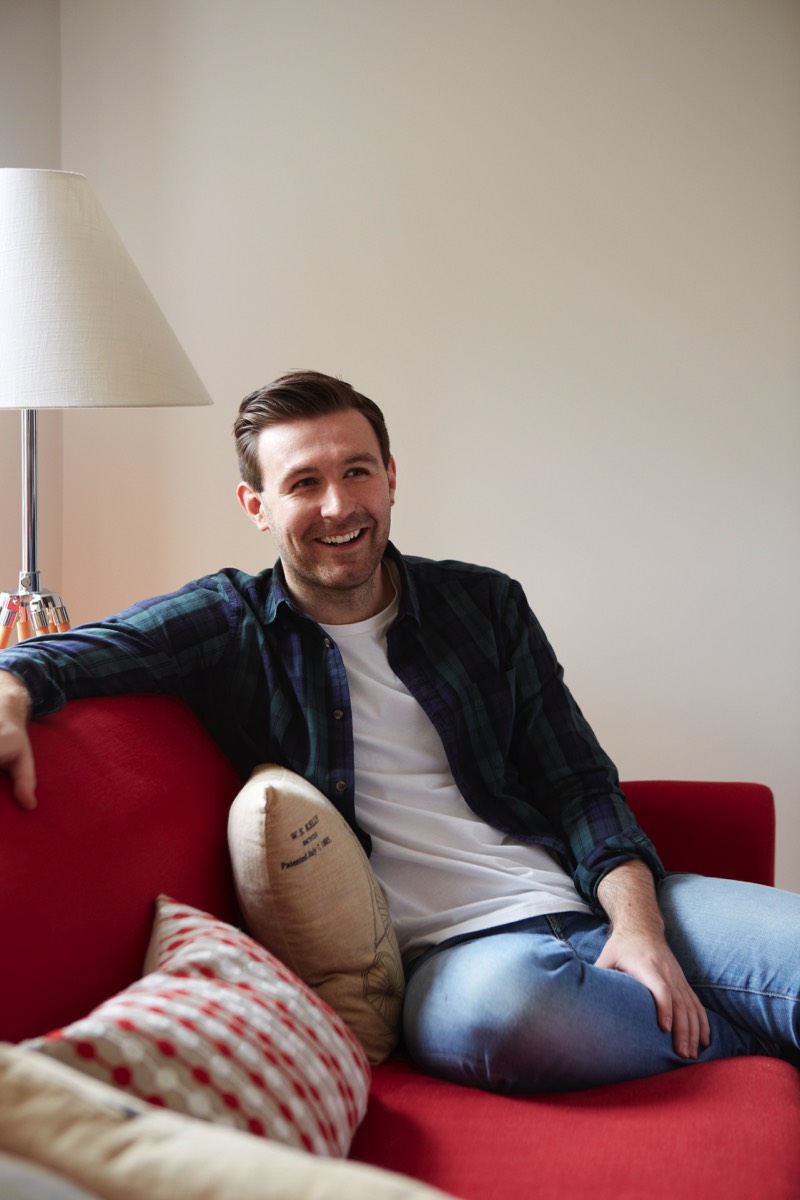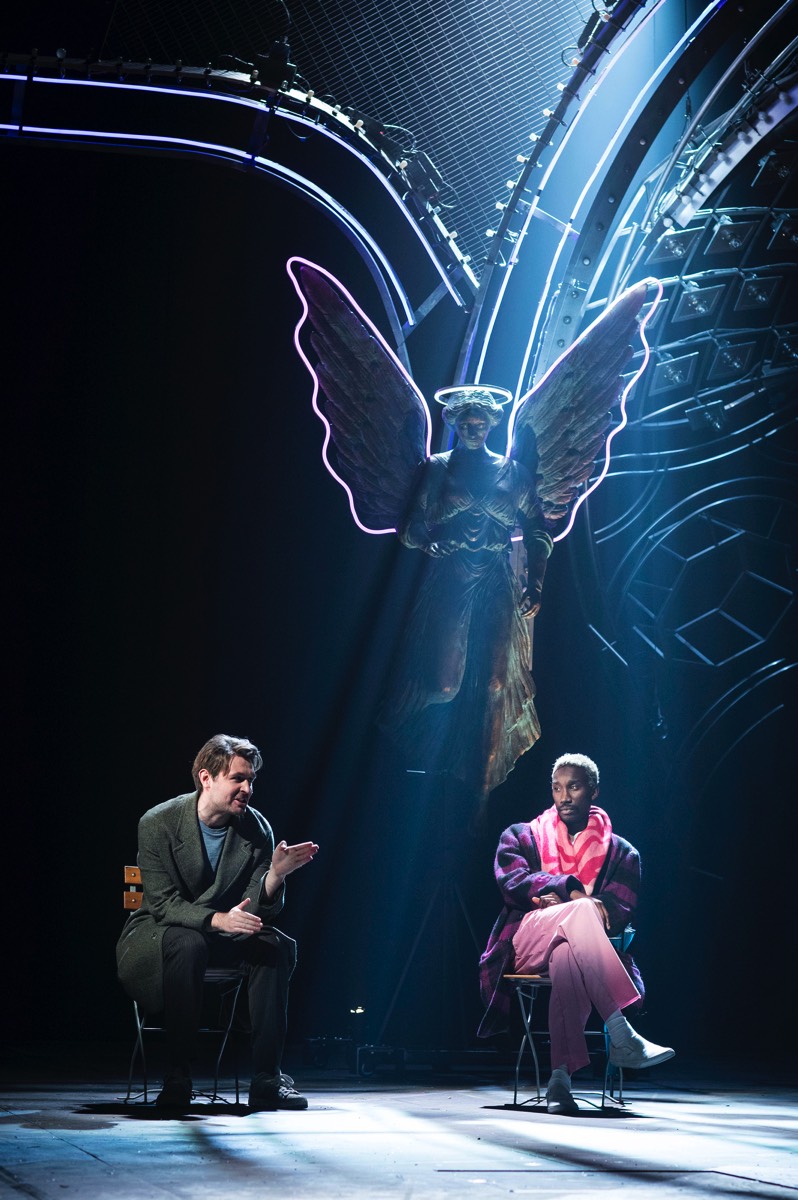INTERVIEW
Surrey’s Premier Lifestyle Magazine
Still dreaming
Scottish actor James McArdle talks to essence about his current role starring in the National Theatre’s Angels in America. James will also take the lead alongside Vanessa Redgrave in this summer’s BBC Two series ‘Man in an Orange Shirt’, part of the BBC’s Gay Britannia season.

James McArdle
Q James, you started as a child actor how did that come about?
A Producers from a television show came to my school looking for a boy to lead a new show for them. I think they were looking for the most obnoxious child they could find...
After that my aunt got me a place at PACE youth theatre in Paisley. I had to choose between acting and swimming as a hobby.
Q What do you think set you apart?
A I don’t know, I have a natural tenacity and drive. But, you know, my parents also worked very, very hard. I come from a working-class background and because of their hard work I had a very secure upbringing in which food and shelter were always provided and I went on holiday abroad every year, or every two years. That level of privilege offered me opportunity. Like having the belief in myself to get to RADA. That belief came from my privilege. Then once I got to RADA I saw what real privilege was and how astoundingly unequal the class system in this country is.
Q You haven’t come from a conventional theatrical background, what drove you to become an actor?
A Well, when I was young, it was a safe form of uninhibited self-expression. I also felt that, when I would try to say something in real life, it wouldn’t have the same resonance with my family as it did when I was on stage saying the same thing, but through a character with someone else’s words. Plus I’ve always had a lot to say. Actor. Writer. Politician. They were the only options for me. And a vet. Weirdly. Sometimes I still dream of being a vet. Maybe when I grow up.
Q You applied to RADA 10 years ago, making the journey alone from Glasgow to the London audition. What were your feelings at the time?
A I just remember thinking, what else will I do if this doesn’t work? I was continually second guessing the choices I’d made about the speeches.
Q How do you think the audition went?
A TERRIBLE. The first attempt at it anyway. I messed it up and left the room. I was the last of the day. I got half way down Gower Street and thought: “No, you can act!” So, I went back. I remember the receptionist, Dee, shouting at me as I ran up the stairs. I came in and asked if I could do it all again. The actor on the audition panel called me a few choice words, before agreeing. I remember they had soup and I told them to “eat their soup” and I would just begin. It went better. Much better.
Q You didn’t tell your parents what you were doing, have they been supportive of your chosen career?
A I think I bewilder them a lot. They have always supported my chosen career. Always. I would never have been able to do this without their 100% support. I’m aware how... strange it is for them.
I don’t think watching some of the things I’ve done on film and on stage was something they saw for their future. But I’m glad it is. I hope they are proud.
A Producers from a television show came to my school looking for a boy to lead a new show for them. I think they were looking for the most obnoxious child they could find...
After that my aunt got me a place at PACE youth theatre in Paisley. I had to choose between acting and swimming as a hobby.
Q What do you think set you apart?
A I don’t know, I have a natural tenacity and drive. But, you know, my parents also worked very, very hard. I come from a working-class background and because of their hard work I had a very secure upbringing in which food and shelter were always provided and I went on holiday abroad every year, or every two years. That level of privilege offered me opportunity. Like having the belief in myself to get to RADA. That belief came from my privilege. Then once I got to RADA I saw what real privilege was and how astoundingly unequal the class system in this country is.
Q You haven’t come from a conventional theatrical background, what drove you to become an actor?
A Well, when I was young, it was a safe form of uninhibited self-expression. I also felt that, when I would try to say something in real life, it wouldn’t have the same resonance with my family as it did when I was on stage saying the same thing, but through a character with someone else’s words. Plus I’ve always had a lot to say. Actor. Writer. Politician. They were the only options for me. And a vet. Weirdly. Sometimes I still dream of being a vet. Maybe when I grow up.
Q You applied to RADA 10 years ago, making the journey alone from Glasgow to the London audition. What were your feelings at the time?
A I just remember thinking, what else will I do if this doesn’t work? I was continually second guessing the choices I’d made about the speeches.
Q How do you think the audition went?
A TERRIBLE. The first attempt at it anyway. I messed it up and left the room. I was the last of the day. I got half way down Gower Street and thought: “No, you can act!” So, I went back. I remember the receptionist, Dee, shouting at me as I ran up the stairs. I came in and asked if I could do it all again. The actor on the audition panel called me a few choice words, before agreeing. I remember they had soup and I told them to “eat their soup” and I would just begin. It went better. Much better.
Q You didn’t tell your parents what you were doing, have they been supportive of your chosen career?
A I think I bewilder them a lot. They have always supported my chosen career. Always. I would never have been able to do this without their 100% support. I’m aware how... strange it is for them.
I don’t think watching some of the things I’ve done on film and on stage was something they saw for their future. But I’m glad it is. I hope they are proud.
Gay Britannia
The BBC announced in April a Gay Britannia season of programming marking the 50th anniversary of The Sexual Offences Act 1967, which partially decriminalised homosexual acts that took place in private between two men over the age of 21.Led by programming on BBC Two and BBC Four, with other content across BBC radio and online, the Gay Britannia season will feature stories that celebrate the LGBTQ community as well as challenging existing preconceptions and prejudices. The season will cast a fresh light on the history of gay Britain, as well as highlighting just what it means to be gay in Britain today.
Q The work has flowed since RADA, but does the prospect of ever being out of work scare you?
A The problem with acting as an art form is that it’s a business. The problem with it as a business is that it’s an art form. It is a fickle game. There are successful actors who can’t act and unsuccessful ones who can. I will always act, even if it is in my shed at the bottom of my garden. If the work ever does dry up...I’ll become a vet.
Q Last year you won the Ian Charleson theatrical award for your 2015 performance of Platonov in Chekov’s play of the same name. Do you agree with John Peter’s reasoning behind the creation of the award that: “Classical work is the solid bedrock of all acting. It is classical acting, with its twin demands of psychological perception and formal excellence, which truly tests and proves the actor’s ability and stamina, both physical and mental.”
A Absolutely! Only the best actors can do theatre. And on top of that, classical theatre. To make that stuff realistic and have pumping blood running through it is a skill worth reaching for if you are at all interested in acting. It separates the men from the boys. It always pushes me to the brink, but I always come away having learned more and gained more authority over what I’ve chosen to do. I’ll always seek to do a play every year or every two years. Plus, loads of these plays are so modern and relevant and I know young people would love them. My mates from Glasgow, all the boys I went to school with and none of whom are actors, loved Platonov. The thing with classical theatre is you have to work hard to be excellent or you’ll be rumbled. There is a lot of room for mediocrity on telly and film. Work that is modish and vain can get passed off for naturalistic and subtle. On stage, there is nowhere to hide. If you’re not telling the truth, they will find you out.
Q You’re now playing Louis Ironson in Tony Kushner’s classic Pulitzer and Tony award-winning play Angels in America. Was it an easy decision to accept the role in this era defining classic?
A Very easy. It’s a complicated role and I was honoured they asked me to do it.
Q Is it a good time to revive the play, as when Trump was elected some people drew parallels with the Reagan era?
A I think this play will always be relevant. In hundreds of years, if there is still a human race in hundreds of years, people will look to this play. It captures perfectly what it is like to be alive in the late 20th/early 21st century. However, it does have an added potency given the current political climate.
A The problem with acting as an art form is that it’s a business. The problem with it as a business is that it’s an art form. It is a fickle game. There are successful actors who can’t act and unsuccessful ones who can. I will always act, even if it is in my shed at the bottom of my garden. If the work ever does dry up...I’ll become a vet.
Q Last year you won the Ian Charleson theatrical award for your 2015 performance of Platonov in Chekov’s play of the same name. Do you agree with John Peter’s reasoning behind the creation of the award that: “Classical work is the solid bedrock of all acting. It is classical acting, with its twin demands of psychological perception and formal excellence, which truly tests and proves the actor’s ability and stamina, both physical and mental.”
A Absolutely! Only the best actors can do theatre. And on top of that, classical theatre. To make that stuff realistic and have pumping blood running through it is a skill worth reaching for if you are at all interested in acting. It separates the men from the boys. It always pushes me to the brink, but I always come away having learned more and gained more authority over what I’ve chosen to do. I’ll always seek to do a play every year or every two years. Plus, loads of these plays are so modern and relevant and I know young people would love them. My mates from Glasgow, all the boys I went to school with and none of whom are actors, loved Platonov. The thing with classical theatre is you have to work hard to be excellent or you’ll be rumbled. There is a lot of room for mediocrity on telly and film. Work that is modish and vain can get passed off for naturalistic and subtle. On stage, there is nowhere to hide. If you’re not telling the truth, they will find you out.
Q You’re now playing Louis Ironson in Tony Kushner’s classic Pulitzer and Tony award-winning play Angels in America. Was it an easy decision to accept the role in this era defining classic?
A Very easy. It’s a complicated role and I was honoured they asked me to do it.
Q Is it a good time to revive the play, as when Trump was elected some people drew parallels with the Reagan era?
A I think this play will always be relevant. In hundreds of years, if there is still a human race in hundreds of years, people will look to this play. It captures perfectly what it is like to be alive in the late 20th/early 21st century. However, it does have an added potency given the current political climate.
James McArdle
The Telegraph describes him as “transfixing” and “magnetic”. James McArdle played two parts in David Hare’s adaptation of Young Chekhov’s Platanov and Ivanov at the National Theatre for which he was nominated for ‘Best Actor’ at last year’s Evening Standard Theatre Awards alongside Ralph Fiennes, Sir Ian McKellen and Sir Kenneth Branagh.James won the Ian Charleson award garnering exceptional reviews across the board for his lead role of Iothario ‘Platanov’. Paul Taylor (the Independent) cites James to be “the most stunningly gifted performer to have emerged since the advent of Eddie (Redmayne) in the Rylance era.”
James’ further credits for theatre include James I: The key will keep the lock, at the National Theatre, Macbeth at the Globe, Spur of the moment at the Royal Court, The heart of Robin Hood for the RSC and a further leading role in the universally acclaimed West End production of Chariots of Fire.
For television, his credits include Golden Globe and BAFTA nominated Page Eight for BBC with Ralph Fiennes and Bill Nighy, the multi-award-winning Appropriate Adult alongside Dominic West and Emily Watson, and the acclaimed film for BBC4 Best Possible Taste: The Kenny Everett Story. For film, his credits include 71 with Jack O’Connell, Star Wars: The Force Awakens and Private Peaceful.
Q In the play your character Louis Ironson leaves his aids-infected lover. Do you have sympathy for him?
A Of course. Prior is Louis’ Goddess. He is having to watch his Goddess die of a terrible disease and the urge to run is so great. I’ve lost loved ones to horrible diseases and the urge to run is great. You feel helpless. You can’t save them. It’s emasculating and heart breaking.
Q Angels in America is a reflection of America in the Reagan era. If you were ever short of work would you move over the water?
A I would work in America if they ever invited me, but I think I would always return home. I love Scotland too much.
Q You’ve had a wealth of accolades for your acting. How do you take all of this praise?
A Well, it’s sort of none of my business in a way. I enjoy working hard to satisfy the perfectionist in me. I have to keep my work for myself or else I’d go crazy. How people choose to accolade me is actually none of my business. I don’t have Facebook or Instagram or Twitter or anything like that.
Q You’ve acted in theatre, films and television, but mainly theatre, is that what you enjoy most?
A I really enjoy filming and being on stage. They feed each other. I will always come back to the theatre though. On stage, you’re in charge of the evening. On screen, you are dependent on a good editor.
Q What do you find to be your best leisure time when not working?
A Swimming. Front crawl. Swimming, swimming, swimming!
A Of course. Prior is Louis’ Goddess. He is having to watch his Goddess die of a terrible disease and the urge to run is so great. I’ve lost loved ones to horrible diseases and the urge to run is great. You feel helpless. You can’t save them. It’s emasculating and heart breaking.
Q Angels in America is a reflection of America in the Reagan era. If you were ever short of work would you move over the water?
A I would work in America if they ever invited me, but I think I would always return home. I love Scotland too much.
Q You’ve had a wealth of accolades for your acting. How do you take all of this praise?
A Well, it’s sort of none of my business in a way. I enjoy working hard to satisfy the perfectionist in me. I have to keep my work for myself or else I’d go crazy. How people choose to accolade me is actually none of my business. I don’t have Facebook or Instagram or Twitter or anything like that.
Q You’ve acted in theatre, films and television, but mainly theatre, is that what you enjoy most?
A I really enjoy filming and being on stage. They feed each other. I will always come back to the theatre though. On stage, you’re in charge of the evening. On screen, you are dependent on a good editor.
Q What do you find to be your best leisure time when not working?
A Swimming. Front crawl. Swimming, swimming, swimming!
essence info
Angels in America is at the National Theatre, London SE1, until 19 August. Man in an Orange Shirt will air on BBC Two this summer, as part of the Gay Britannia season.NT Live broadcasts of Angels in America will take place to cinemas around the UK and internationally – Part One on 20 July and Part Two on 27 July. More info can be found at: ntlive.nationaltheatre.org.uk.
James McArdle (Louis) and Andrew Garfield (Prior) in Angels in America - Millennium Approaches PHOTO COPYRIGHT: Helen Maybanks

Angels in America
Marianne Elliott’s revival of Tony Kushner’s 1993 modern classic is nothing less than the biggest theatrical deal of 2017. Subtitled A Gay Fantasia on National Themes, the play is an era-defining, two-part look at America during the eighties’ Aids crisis. As a group of New Yorkers struggle with love, fidelity and illness, the everyday and the numinous start to merge and blend in grand style. Pulitzer (drama) and Tony award (best play) winning, the play is a complex examination of AIDS and homosexuality in America in the 1980s. Certain major and minor characters are supernatural beings (angels) or deceased persons (ghosts). The play contains multiple roles for several of the actors. Initially and primarily focusing on a gay couple in Manhattan, the play also has several other storylines, some of which occasionally intersect. The two parts of the play are separately presentable and entitled Millennium Approaches and Perestroika, respectively.“The problem with acting as an art form is that it’s a business. The problem with it as a business is that it’s an art form. It is a fickle game. There are successful actors who can’t act and unsuccessful ones who can.”

